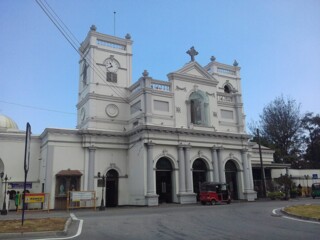In Colombo
Shubhanga Pandey
On the morning of 21 April, before the co-ordinated suicide bomb attacks on three churches and three luxury hotels that killed more than 250 people, Sri Lanka had been transitioning from one festive season to another: from the traditional new year the previous weekend, marking the turn of the agricultural calendar, to Easter Sunday. The streets of Colombo were quiet.
They’ve been relatively quiet since the attacks, too, though the city is still on edge. On Tuesday afternoon, the government warned that there could be a lorry or van loaded with explosives somewhere in the capital. News of controlled explosions by the bomb squad kept appearing on Twitter, one of the few social-media sites not blocked by the government following the attacks. On the streets, vehicles seem to have been giving each other a wider berth than usual. At my local supermarket, a freshly printed announcement asks customers to avoid bringing in backpacks, but, if they do bring one in, to help the security guard go through it.
On Twitter, people were soon mining Sri Lanka’s recent history for traces of something that might provide some context for the violence: threats against churches, the defacing of Buddha statues some months ago, the anti-Muslim mob violence of last year, the worrying Buddhist majoritarianism – all true, but none adequate to explain a premeditated attack on this scale.
Two days after the bombings, Islamic State claimed responsibility. Over seventy people have been arrested in the past six days and a local Islamist group has been declared complicit. The authorities have identified nine suspected suicide bombers, including two brothers, the sons of one of Sri Lanka’s biggest spice exporters. A CCTV clip shows one of them emerging from the lift on the third floor of the Shangri-La Hotel on Sunday morning and heading to the breakfast buffet, where he blew himself up. (The hotel, closed until further notice, is in downtown Colombo, overlooking the new International Financial City that’s being built on reclaimed land with Chinese capital, to ‘fill the vacuum’, the developers say, between Singapore and Dubai.) A few hours later, during a police raid on their house, the Shangri-La bomber’s pregnant wife reportedly blew herself up, along with three of her children and three officers. The bombers appear to have been led by Zahran Hashim, a troublemaking preacher with a history of being expelled from seminaries for his extremist views, who had mustered a network of followers through his YouTube polemics.
This is an election year in Sri Lanka. Popular sentiment towards the government is oscillating between frustration and anger: not only did it fail to act on multiple intelligence tips of potential attacks, but the information allegedly never reached either the prime minister, Ranil Wickremesinghe, or the president, Maithripala Sirisena. The two men are from different parties, and the rift between them has been a constant of political life in Colombo in recent months. Late last year, Sirisena dismissed Wickremesinghe and appointed the former president Mahinda Rajapaksa in his place. The ensuing constitutional confusion over prime ministerial legitimacy was resolved when the courts ruled in Wickremesinghe’s favour and he was reinstated. Among other things, the Easter Sunday blasts have come to be seen as the deadly cost of a dysfunctional government.
Even its admirably cautious approach in releasing details of the suspects has been eclipsed by subsequent blunders. On Thursday, the police admitted they’d mistakenly circulated the photograph of an undergraduate in the US as a suspect at large. Minutes later, the health authorities revised the death toll down by more than a hundred – from 359 to 253 – because of errors in deducing the count from body parts.
As the immediate shock of the attacks dissipates, there is a fear that they may undo the progress made in the ten years since the brutal end of Sri Lanka’s civil war. The president claimed on Friday that prosecuting soldiers for alleged war crimes had weakened national security. One MP from the ruling party has proposed a bill to ban burqas in public.
The atmosphere of fear persists. On Friday night, a gun battle between the armed forces and several suspects at a safehouse in a town in the east of the country ended with more explosions, 15 deaths, and the discovery of a large cache of explosives. Meanwhile, religious leaders across faiths have been asking their followers to maintain peace and avoid blaming particular communities for the violence. Several mosques in Colombo stopped broadcasting the call to prayer over loudspeakers. The day after the attack, a video of a funeral at a mosque in Negombo circulated online. As a Muslim father mourned his 13-year-old daughter, who died in one of the church blasts, a group of Christian women prayed the rosary. Despite everything, there are grounds for confidence in the resilience of Sri Lanka’s social fabric.
